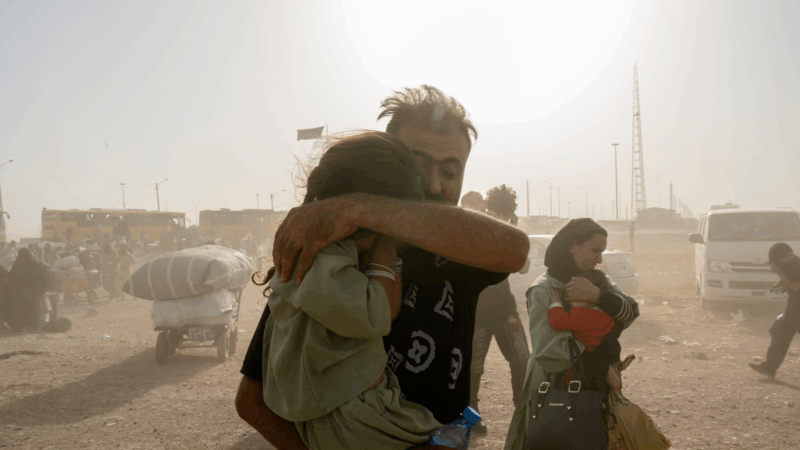Afghans caught in mass deportations in Iran face an uncertain future at home
A few weeks ago, Barakzai, an Afghan refugee, noticed that her usually friendly coworkers at a clothing store in the Iranian capital, Tehran, began treating her differently. They became cold and distant, she says.
“They don’t view Afghans the way they used to. They see Afghans as enemies,” she says. “They tell us: ”You are a spy. Our government is right. You should be fired.'”
We are identifying Barakzai by her last name only to protect her identity because she is still in Iran and fears deportation.
Earlier this year, Iran ordered Afghans living illegally in the country to leave, saying it can no longer support them. Of the roughly 6 million Afghans living in Iran, 2 million are without legal status.
Since then, more than 1.3 million Afghans have returned to Afghanistan, according to the Office of the United Nations High Commissioner for Refugees. Iran has redoubled its effort since last month’s Israel-Iran war, Barakzai says, using disinformation to label Afghans as Israeli spies to help its goal of removing thousands from the country.
The government campaign has also targeted Afghans’ housing, employment and banking.
“They don’t allow Afghans to withdraw their money from the banks, or have the right to work,” she says. “They even said that anyone who employed Afghans would be imprisoned and even fined. And they forced landlords to stop renting to Afghans.”
The immigration raids in public spaces have terrified Afghans.
“At the metro station, I saw the police take Afghan men and beat the women,” Barakzai says. “I couldn’t raise my voice, because I was in danger myself. Right now, I pretend I am not Afghan, so that no one will recognize me.”
The public raids have had a desired effect: Thousands of Afghans are heading every day from Iran to Afghanistan through the Islam Qala border crossing between the two countries. Some arrive in buses and are offloaded at the border; others pack up on their own and leave.
“We went from 5,000 people a day to 30[000], 40[000], and even on some days, 50,000 people coming back per day from Iran,” says Arafat Jamal, the UNHCR representative in Kabul. “What surprised us at the moment is the sheer scale and in particular the intensity of returns from Iran.”
Samira Sayed Rahman, the advocacy director for Save the Children in Afghanistan, says some people arrive at the crossing wearing one shoe because they lost the other in a deportation raid.
“The lucky ones have had to pack up their lives overnight,” she says. “Others have had to leave with just the clothes on their back.”
The crisis within Afghanistan
Iran isn’t the only country expelling Afghans. Afghans are coming back also from Pakistan and, most recently, Tajikistan.
“What we’re facing at the moment is really a crisis on three borders,” says UNHCR’s Jamal.
Accommodating more than 1.6 million people returning from all those countries has presented an enormous challenge to Afghanistan. A 2024 United Nations report found that 23.7 million people — over half of the population — required humanitarian assistance last year.
It’s likely to get worse: In addition, U.S. Secretary of State Marco Rubio terminated all but two State Department and USAID programs in Afghanistan, one of which expired at the end of June. In total, 22 programs worth nearly $1.03 billion were shuttered, according to the Special Inspector General for Afghanistan Reconstruction. Aid workers say they fear the returnees refugees will make the challenge more pressing.
“Many families already in Afghanistan can barely feed their own children,” Rahman says. “And now they’re also being asked to help absorb thousands, millions more.”
In addition to cuts in U.S. foreign aid, a high unemployment rate has further pushed people into poverty. Banking restrictions and sanctions have put pressures on business. The loss of remittances from expatriate workers, a vital part of Afghanistan’s economy, is also hurting.
“Even those in the private sector have been struggling to create jobs, struggling to do imports and exports because of the banking restrictions that are in place,” Rahman says.
Those returning have more questions than answers.
“They didn’t know how they were going to be able to feed their family,” Rahman says. “Where are they going to establish themselves? They were scared.”
A New Reality
Many Afghan women returning to Afghanistan face a new and restrictive government that doesn’t allow them to work, study or even go outside unaccompanied.
“Certainly for the women…the girls have been through schooling and they are really in a state of shock,” Jamal, the UNHCR representative, says.
Jamshidi, 24, is one such woman. We are only using her last name to protect her identity because of fear of reprisals from the Taliban. Four years ago, she was forced to interrupt her education at Herat University in Afghanistan when the Taliban came to power and banned schooling for women. She fled to Iran to continue her education. As she was about to graduate with a degree in political science from Ferdowsi University of Mashhad in Iran, the war between Israel and Iran broke out. She had to leave again.
“It was very difficult psychologically, because I was planning on getting a bachelor’s degree and thinking what kind of work to do,” she says. “And then there is war there and you have to go back to your own country. It hurt us a lot.”
The UNHCR estimates that if the rate of returnees continues, it will reach 3 million Afghans by the end of the year.
Back in Tehran, Barakzai, the Afghan woman who is staying on in Iran, is trying to leave her apartment as little as possible to avoid deportation.
“The real war,” she says, “is not between Iran and Israel, it’s between Iran and the Afghan refugees.”
Team USA faces tough Canadian squad in Olympic gold medal hockey game
In the first Olympics with stars of the NHL competing in over a decade, a talent-packed Team USA faces a tough test against Canada.
PHOTOS: Your car has a lot to say about who you are
Photographer Martin Roemer visited 22 countries — from the U.S. to Senegal to India — to show how our identities are connected to our mode of transportation.
Sunday Puzzle: TransformeR
NPR's Ayesha Rascoe plays the puzzle with listener Joan Suits and Weekend Edition Puzzlemaster Will Shortz.
Looking for life purpose? Start with building social ties
Research shows that having a sense of purpose can lower stress levels and boost our mental health. Finding meaning may not have to be an ambitious project.
Danish military evacuates US submariner who needed urgent medical care off Greenland
Denmark's military says its arctic command forces evacuated a crew member of a U.S. submarine off the coast of Greenland for urgent medical treatment.
Only a fraction of House seats are competitive. Redistricting is driving that lower
Primary voters in a small number of districts play an outsized role in deciding who wins Congress. The Trump-initiated mid-decade redistricting is driving that number of competitive seats even lower.






